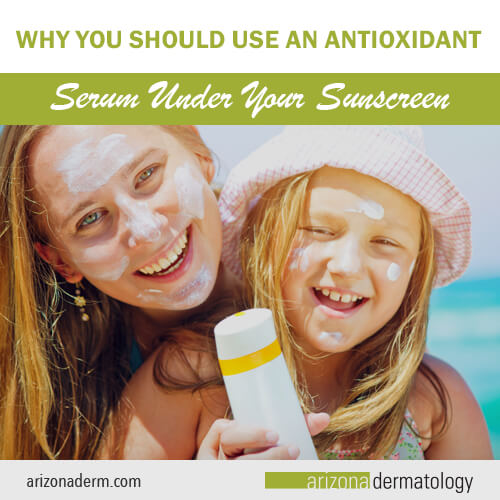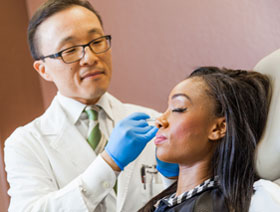 Most people understand the need to use sunscreen every day. That’s great news! But did you know you can boost your sunscreen’s effectiveness and skin protection by adding one additional step to your skincare regimen: an antioxidant serum under your sunscreen.
Most people understand the need to use sunscreen every day. That’s great news! But did you know you can boost your sunscreen’s effectiveness and skin protection by adding one additional step to your skincare regimen: an antioxidant serum under your sunscreen.
Something you didn’t know about sunscreen
Chemical sunscreens do a good job protecting you from UVA and UVB rays, but ingredients like Avobenzone and Octinoxate produce free radicals, meaning your chemical sunscreen is giving you wrinkles, too! Applying an antioxidant underneath your sunscreen helps counteract this effect by neutralizing free radical damage.
Antioxidants are molecules that seek out free radicals– atoms with a single electron that are highly reactive and cause oxidative damage in the body. Electrons always want to exist in pairs, so antioxidants “donate” an electron to these free radicals, consequently stabilizing them.
What exactly do antioxidants do?
The better question is, what don’t antioxidants do!
- Antioxidants counteract the signs of aging. By neutralizing free radicals, antioxidants prevent and correct fine lines, wrinkles, loose skin and blotchiness, while also giving skin a more youthful glow.
- Antioxidants help prevent sunburn. The natural anti-inflammatory effects of antioxidants dampen your skin’s response to the sun, adding a layer of sunburn protection.
- Antioxidants repair skin. By reducing inflammation, antioxidants allow the skin to heal naturally, correcting visible damage. Some also boost collagen production, improving skin’s elasticity and texture.
What about sunscreens that have antioxidants in them?
While it won’t hurt to apply a sunscreen that already contains antioxidant ingredients, for best results, this isn’t the place to skip steps. Antioxidants break down when exposed to sun and light, which is the reason you’re wearing sunscreen in the first place, right? Even if they don’t break down, it’s difficult for antioxidants to do their job when they are competing with SPF ingredients. Your best bet is to apply an antioxidant serum first, then a sunscreen on top of it. To minimize free radical exposure even further, choose a mineral sunscreen with zinc oxide or titanium dioxide. These ingredients won’t break down to produce free radicals.
List of Antioxidants
What exactly are you looking for as far as ingredients go? Here’s a short list of some of the most effective antioxidants for your skin.
Vitamin C
This popular antioxidant is a favorite because, in addition to scavenging free radicals, it also boosts collagen production and helps to fade dark spots. Vitamin C might also be listed as L-ascorbic acid or ester-C on an ingredient list. Tetrahexyldecyl ascorbate (THD) is a more stable, creamy form of the antioxidant which is able to penetrate more deeply into skin layers, making it a better option for increasing collagen production.
Vitamin A (Retinol)
Sound familiar? Vitamin A, or retinol, is a tried-and-true anti-aging ingredient that is also an antioxidant. Its small molecular structure allows it to penetrate deeply into the skin, stimulating collagen production and accelerating cell renewal and repair. This helps smooth fine lines and wrinkles while also improving skin tone.
Vitamin E
It’s no surprise that vitamin E is on the list. In addition to its antioxidant properties, Vitamin E is well-known for boosting skin’s healing ability.
Resveratrol
Found in the skins of grapes and berries and also in tea and red wine, resveratrol protects against environmental attackers like air pollution, UV radiation and microbes.
CoenzymeQ10
Also called ubiquinone, this antioxidant helps fight off free radical damage and keeps skin cells healthy as well as stimulates collagen production.
Niacinamide
Also known as vitamin B3, Niacinamide is a powerful antioxidant that improves skin texture and tone, reduces fine line and wrinkles, corrects hyperpigmentation, and works as an anti-inflammatory.
Polyphenols
Polyphenols are the “good” ingredients found in wine, chocolate and green tea. Both ingested and applied topically, they prevent inflammation, defend against oxidative stress, protect against UV-induced photodamage to the skin, and may even inhibit the development of skin cancer.
Flavonoids
You may have heard of flavonoids, found in green and black teas. Flavonoids reduce inflammation and oxidative stress. They also absorb UV light, reduce collagen degradation, delay skin aging, and influence cellular function to protect against photoaging and damage.
Glutathione
This powerful antioxidant helps detoxify skin, reduces the appearance of wrinkles, and makes skin smoother and more supple.
Alpha Lipoic Acid
This antioxidant reduces fine lines and smooths out roughness caused by sun damage. It has also been shown to improve skin elasticity.
Interested in learning more about skin care products that can keep your skin healthy and youthful-looking now and in the future? Make an appointment with one of our medical or aesthetic providers today.


